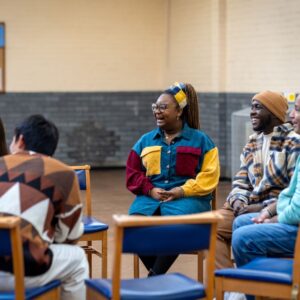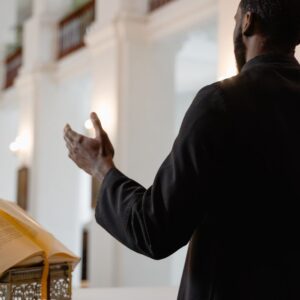Community is a long-standing value and component of Christian religious life. Yet, the winsome idea that people can gather around a shared mission, worship and devotion to the life of Jesus is not enough for many of today’s believers. In one survey by Lifeway, 50 percent of Protestants admitted that they also prefer that their congregation reflect their own political views.
This trend reveals a fundamental shift in how Christians approach the church community, moving from accepting theological diversity to seeking political homogeneity. What does this mean for the historical value of community, and how do church leaders foster a sense of community and belonging in congregations divided by politics?
The Reality of Division in 2025
The Christian landscape has shifted dramatically since the mid-2000s. In 2007 only 50 percent of white evangelicals were Republican, but today three-quarters of white Americans who attend religious services weekly or more often now identify as Republican or lean towards the Republican Party. Meanwhile, cultural and political polarization: Gallup (2023) has observed that church membership is increasingly divided along political lines, with more liberal and progressive individuals often feeling alienated by the conservative stances some churches adopt on political and social issues.
This division extends beyond party affiliation. Overall, three in ten Americans qualified as Christian nationalism adherents or sympathizers, compared with two-thirds who are skeptical or outright rejecting this ideology.
Historically, churches have congregated with like-minded people. Geographic and cultural factors naturally created communities of shared values. This is harder to do in 2025. The chances of having someone in the next pew who sees the world vastly differently have increased exponentially. Suburban growth patterns, job mobility, and changing family structures mean our congregations include people who might never have encountered each other a generation ago.
Theological Diversity vs. Political Homogeneity
The shift from accepting theological diversity to seeking political homogeneity represents a fundamental misunderstanding of what has historically held Christian communities together. Theological diversity has long been tolerated within orthodoxy, where differences over baptism modes, church governance, spiritual gifts, or eschatology rarely fractured congregations permanently. These disagreements were seen as secondary matters where faithful Christians could “agree to disagree” while maintaining fellowship around core gospel truths. Churches learned to navigate differences between Calvinists and Arminians, cessationists and charismatics, presbyterians and congregationalists within the same denomination or even the same local church.
But today’s political divisions cut deeper because they often involve fundamental questions about authority, truth, and moral frameworks that transcend policy preferences. When congregation members cannot agree on basic epistemological questions—how we know what we know, whose voices we trust, what sou
Community Beyond the Buzzwords
Community has been a cultural buzzword since the mid-nineties, thrown around in everything from corporate team-building to social media platforms. But for Christians, community represents something far more fundamental than a marketing term or therapeutic concept. Community is woven into the fabric of our faith tradition, from the early believers who “had all things in common” to Jesus’s own ministry model of calling disciples into relationship with one another.
The simplicity of this concept makes it easy to ignore or forget. We assume we understand community because we use the word constantly. Yet genuine Christian community requires more than shared space, similar preferences, or even theological agreement. It demands the harder work of remaining in relationship across difference.
Genuine Christian community demands the hard work of remaining in relationship across difference.
True community emerges when we recognize that our shared identity in Christ transcends our political affiliations, cultural backgrounds, or personal preferences. This doesn’t mean differences disappear or become irrelevant. Rather, it means we learn to hold those differences within the larger framework of our common calling to love God and neighbor.
The Limits of Virtual Connection
Our culture’s massive move to engage online plus the cultural upheaval of the pandemic has skewed our understanding of community and even what it means to be in relationship.
The pandemic accelerated our movement toward digital relationships, and some churches have continued prioritizing virtual engagement over in-person gathering. About a quarter of U.S. adults regularly watch religious services online or on TV, and most of them are highly satisfied with the experience.
While virtual worship serves important purposes, particularly for those unable to attend physically, it cannot replace the irreplaceable elements of embodied community.
Even engaged virtual participants will miss the essential human elements that build authentic community. It’s harder to diminish someone’s humanity when they are standing in front of you. Physical presence forces us to encounter the full complexity of another person, not just the curated version they present online or the assumptions we make from a distance.
Real community building happens in the margins of formal programming. It emerges during coffee conversations after worship, in the parking lot discussions, and in moments when someone’s child has a meltdown and others step in to help. These unscripted encounters create the relational foundation that sustains communities through disagreement and conflict.
Practical Strategies for Community Building
Church leaders seeking to foster genuine community amid division need concrete approaches that move beyond conflict management to relationship cultivation.
Create Intentional Spaces for Story-Sharing Most congregational conflict stems from people making assumptions about others’ motivations, backgrounds, or beliefs. Regular opportunities for congregation members to share their personal stories, spiritual journeys, and life experiences help humanize those who might otherwise remain faceless representatives of opposing viewpoints.
Prioritize Collaborative Service Working alongside someone toward a shared goal builds relationships in ways that discussion groups often cannot. Whether serving meals at a homeless shelter, tutoring children, or maintaining church property, collaborative action creates bonds that transcend political differences. People discover they can trust and rely on those with whom they disagree politically.
Establish Clear Behavioral Covenants Community flourishes within healthy boundaries. Congregations need explicit agreements about how members will engage with one another, particularly around controversial topics. These covenants should address both in-person and digital interactions, establishing standards for respectful dialogue while preserving space for substantive disagreement.
Model Vulnerability from Leadership Congregation members take cues from their leaders about acceptable behavior and attitudes. When pastors and lay leaders demonstrate humility, acknowledge their own mistakes, and show genuine curiosity about others’ perspectives, they create permission for similar vulnerability throughout the community.
Design Programming for Relationship, Not Just Information Many churches fill their calendars with educational programs that treat community members as individual consumers of religious content. Instead, prioritize programming that requires interaction, collaboration, and mutual dependency. Small groups work best when they involve shared projects or mutual support rather than simply discussing predetermined curriculum.
Learning from Both Sides
Effective community building requires learning from both conservative and progressive voices about what creates lasting fellowship. Progressive congregations that are in decline aren’t in decline because they’re progressive. They’re in decline for the same reason that many conservative congregations are in decline: organizational dysfunction/brokenness and general shifts in cultural attitudes/behaviors.
Conservative churches often excel at creating clear expectations and shared rituals that build collective identity. Progressive churches frequently demonstrate strength in welcoming diversity and creating space for questioning. The most resilient communities integrate both approaches, offering clear frameworks for life together while maintaining flexibility for different expressions of faith.
People are interested in a church that is honest about who it is and knows how to operate beyond the walls of old buildings and actually lives out the ideals of love, forgiveness, and compassion that Jesus teaches and transforms lives with. This authenticity attracts people across political divides who hunger for genuine spiritual community.
The Call to Return to Incarnational Faith
Virtual relationships, while valuable, cannot substitute for the incarnational nature of Christian faith. Jesus took on flesh and dwelt among us, and our communities must reflect this embodied reality. When we prioritize convenience over presence, we lose something essential about what it means to be the body of Christ.
Yet, just getting in the same room won’t solve all of our problems. There is a significant difference in the way generations interact, and points to a broader cultural shift away from in-person connection. Churches must intentionally counter this trend by creating irresistible opportunities for face-to-face relationship building.
Physical presence forces us to encounter others in their full humanity rather than as representatives of positions we oppose. It’s significantly more difficult to demonize someone whose children you’ve watched grow up, whose struggles you’ve witnessed firsthand, whose kindness you’ve personally experienced.
Building on Transforming Engagement Foundations
The work of community building connects directly to principles we’ve explored in previous articles. Our Pastor’s Practical Checklist for How to Lead Hot Conversations provides specific tools for navigating difficult discussions within community contexts. Similarly, Creating Theological Frameworks Inside of Community Conversations offers approaches for grounding contentious topics in shared theological foundations.
Community building and skillful conversation go hand-in-hand. Healthy communities provide the relational foundation that makes difficult conversations possible, while good conversation practices strengthen community bonds over time.
Ten Community-Building Resources for Pastors and Leaders
- Lewis Center for Church Leadership Research-based resources on congregational health, conflict resolution, and leadership development
- Sojourners – Faith in Action Progressive Christian organization offering resources on social justice, community organizing, and faithful engagement
- Alban Institute at Duke Divinity School Research-based resources on congregational conflict, health, and transformation including practical tools for mediation teams, conflict management, and healing divided congregations
- Sojourners – Politically Divided Congregations Curriculum Specific curriculum designed for politically divided churches providing biblical frameworks and practical tools for civil dialogue and reconciliation within congregations
- Minnesota Council of Churches – Respectful Conversations Facilitated discussion model designed for congregations to bridge divides with proven methods. Includes host toolkits and conversation guides
- Center for Healthy Churches – R12 Tools New toolkit specifically designed to help congregations understand, assess, and respond to political and cultural polarization within their own walls
- Barna Group Research Current data and insights on church trends, generational differences, and community engagement patterns
- Faith Communities Today (FACT) National research project providing data-driven insights on congregational health and vitality
- JustFaith Ministries Small group programs and resources for faith-based justice education that build community across difference
- Interfaith Worker Justice Multi-faith network organizing religious communities around economic justice and worker rights
Christians for Social Action Scholar-activists connecting faith and justice with practical tools for congregational engagement










0 Comments